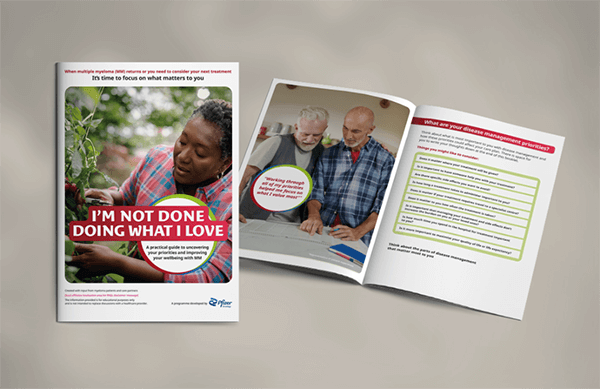Managing difficult conversations

Supporting someone through an illness like multiple myeloma may be difficult at times. If you’re trying to stay positive, but a loved one isn’t, this could make things feel even harder. It’s important to know how to manage tough conversations to help you and your loved one stay on track and focussed on the future. Also remember that, even if you would like a particular outcome, your loved one will need the time and space to make their own decisions.
Start the conversation
Everyone handles news differently. MM coming back or another treatment needing to be considered may feel like a worrying time for both patients and their loved ones, like you.1 Here are some tips for getting conversations started during challenging times.
If they won’t open up and talk to you about how they’re feeling
Your loved one may try to protect you by hiding the stress that they’re feeling.1 Let them know that you are there to support them. You could also suggest they speak to a counsellor.1 This could help your loved one talk openly about worries they feel they may not be able to share with you.1
If they don’t want to try the 3-step programme
Some people may take time to adjust to the news that their MM has come back or they need to consider the next treatment.1 After this, they may want to start to take control of their situation.1 Don’t push them, but it may help to tell your loved one how the programme could benefit them by sharing the programme overview in the downloadable booklet or showing them the overview video that explains it. Let them know that there are simple tools you can use to help them uncover their top priorities. This could then help their healthcare team find a new care plan that might work for them.2
If they want to stop their care plan
Your loved one may reach a point where they don’t want to try more treatment for their MM.1 Making a decision to stop treatment is not easy and should involve the healthcare team.1 Based on your loved one’s priorities, there may be a care plan that could better suit their needs.2
Practice active listening
Good communication takes practice and effort to really listen to what your loved one is saying.3
- When having difficult conversations, focus on what your loved one is saying, instead of thinking about what you want to say next3
- Encourage your loved one to do the same3
- Don’t assume you know what they’re thinking or feeling3
- Tell them what you’ve understood from what they were saying, in your own words3
Example:
“It sounds as if you’re worried about being a burden. That’s why you’re not telling me how you’re really feeling. Is that right?”
- Asking your loved one if you’ve understood what they’re trying to tell you will help clear up any misunderstandings3
Example:
“I didn’t go to your last appointment with you because I thought you didn’t want me there. But it sounds as if perhaps you didn’t think I had the time. Is that right?”
Prepare for challenging days
Even if your loved one has adjusted to their situation, not every day will be an easy one.1 Preparing for some of the challenges that might come your way could help you support your loved one when things don’t go as planned. Patient groups can also offer emotional, practical, and social support.1
Tackle the uncertainty of MM
Not knowing when MM could come back or a treatment could stop working can make some people feel worried.1 Anxiety before hospital appointments and test results is common.1 Seeking support from loved ones may help.1 The healthcare team may also be able to help put your loved one’s mind at ease.1 Counselling or ‘talking therapies’ such as cognitive behavioural therapy (CBT) could help your loved one to change the way they think and behave.1 This may help them manage their concerns.1
Try to get ahead of ‘off’ days
Help your loved one to plan something they enjoy every day.1 It could be as simple as going for a short walk or taking up a hobby.1 This could make a difference to their mood, and yours, and could help them stay positive, even during difficult times.1
Be alert to side effects
If your loved one has experienced side effects on previous treatments for MM, they may already have ways of coping with them.1 This could help reduce anxiety for you and your loved one.1 However, in the event of a side effect, you should report it to your healthcare team as soon as possible, so they can give you advice.1
[The medical jargon buster could help you with any terms you don’t understand].
References
- Myeloma UK. Infopack for relapsed and/or refractory myeloma patients. Available at: https://www.myeloma.org.uk/documents/infopack-for-relapsed-and-or-refractory-myeloma-patients/ Accessed: May 2024.
- Auclair D, et al. Patient Preference and Adherence 2022:16;573-85.
- Cancer.net. ASCO Answers: Talking With Your Spouse or Partner About Cancer. Available at: https://www.cancer.net/coping-with-cancer/talking-with-family-and-friends/talking-about-cancer/talking-with-your-spouse-or-partner-about-cancer. Accessed: May 2024.
- MMRF. Caregiver guide. Available at: https://themmrf.org/wp-content/uploads/2021/05/Caregiver_Booklet_2021_04132021.pdf Accessed: May 2024.








